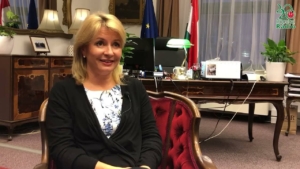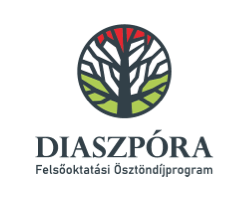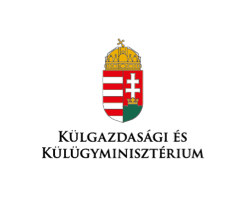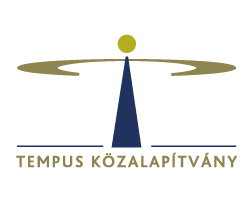
2022-05-08
The Government of Hungary has established this scholarship offer launching these days as part of its national policy, and to settle an old debt.
Managed by the Ministry of Foreign Affairs and Trade the scholarship program is aimed at the younger generations of the Hungarian diaspora retaining their Hungarian identities living outside of the country and wishing to nurture this national identity in a university course in the homeland of their families. An interview in Bocskai Rádió (https://www.bocskairadio.org).
—Anchor:
Dear audience, I am standing at the Ministry of Foreign Affairs and Trade. I am here to sit down for an interview with State Secretary Dr Orsolya Pacsay-Tomassich about the Hungarian Diaspora Scholarship Programme. I will ask her to tell us about the Programme in detail to motivate as much of the target audience as possible to apply for the scholarship. The program launches the next academic year, but the application is open from November this year.
Dear State Secretary, first of all, let me thank you for your time in the name of the audience of Bocskai Rádió. We appreciate the opportunity to have you on air and talk to you about the Hungarian Diaspora Scholarship Programme. Our Hungarian community was elated to learn about this scholarship program. I would like us to delve a little deeper into the details to raise the motivation of the targeted younger generations about it even higher. Let us start with the goal: what does the Government of Hungary aim to achieve with the Programme? Does it address some long-standing need or demand?
—Orsolya Pacsay-Tomassich:
First of all, let me thank you, Bocskai Rádió, and your audience for the opportunity. I am likewise elated to hear that your community is aware of the Hungarian Diaspora Programme which will launch soon. This is obviously great news for us that the program is already so well-known. We have put a lot of work into it: the Government of Hungary has been actively communicating it, and our ministry also launched a rather intensive promotional campaign a few months ago to inform as many of our potential scholarship applicants about this offer as possible. The Government of Hungary has established the Programme tailored to address the Hungarian diaspora around the world, these people whose family roots trace back to Hungary and who identify themselves as Hungarians and offer them a chance to have their college and university studies in Hungary. This is undoubtedly an old debt and a program that does, indeed, address a definite need. There has already been a range of opportunities for the Hungarian youth living abroad in the Carpathian Basin to do their college and university studies in Hungary. And there is also the Stipendium Hungaricum scholarship program aimed primarily at the younger generations of developing countries to come and study at Hungarian colleges and universities, then bring back the knowledge to their communities that need this knowledge badly. This new scholarship targets specifically those who are proven to have Hungarian roots, identify themselves as Hungarians and have profound intentions to return to the homeland of their families. The scholarship is open to those who have some kind of proof of all this.
—Anchor:
What kinds of proof are we talking about here? Is it an interview? Or specific documents? Maybe recommendations?
—Orsolya Pacsay-Tomassich:
This last one. The applicants will be required to present recommendations. Our key partners in the verification will include the external services of the Ministry of Foreign Affairs and Trade as well as various organizations of the Hungarian diaspora. This means anyone who can prove with documents to come from a Hungarian family will be guaranteed to pass this step. And even those who have no document-based proof of their Hungarian roots won’t have to worry about their chances for the scholarship, provided their local Hungarian communities can attest to their active participation – or even just their presence in the community, really. And these are just two ways to prove eligibility for the scholarship. There are a lot of other ways one can prove their Hungarian identity and roots. I think it is easy to understand that we have to filter the pool of applicants – after all this is an outstanding opportunity for these young people to have their studies in one of the very highly regarded Hungarian colleges or universities, and we have to make sure that only those we aim to provide this great opportunity with being able to take it. The Government of Hungary aims to offer those and only those who do qualify and wish to nurture their Hungarian identity, an opportunity to participate in this program beyond „merely” maintaining this identity they can grow and bloom it. We are talking about young people for whom being Hungarian is an active experience thanks to their parents and grandparents who had been keeping the traditions alive and passed them from generation to generation, send the kids to Sunday school, make sure they learn, and then use Hungarian. But also, those for whom being Hungarian is not an everyday experience, but rather part of the family history in anecdotes and reminiscences. This scholarship program is an outstanding opportunity for all these young Hungarians who not only want to get to experience Hungary firsthand – maybe only because they have heard how beautiful this country is – but also study at highly regarded Hungarian universities and colleges. Maybe they were told how exciting it is to get back to where their ancestors had lived – maybe they „simply” think of Hungary as an exotic place. This or that, they will experience what it feels like and means to be Hungarian. The goal of this program is to provide those who identify themselves as Hungarians, with an opportunity to deepen this sense of belonging to the nation. We will help them reinforce this identification. And, whether eventually, they decide to stay in Hungary or return to their communities and participate in keeping those alive and strong… both are fascinating outcomes. I firmly believe that no matter which scenario plays out, both will be success stories.
—Anchor:
Now that we know the conditions of eligibility for the program, are there any disqualifiers? I mean, apart from not being Hungarian of course.
—Orsolya Pacsay-Tomassich:
Application is open to individuals at or over the age of 18. They need to have a place of residence outside of Hungary. A permanent residence that is. The applicants must also have to provide us with proof that they have had the last 4 years of their secondary level studies abroad, and have lived the past 10 years outside of Hungary. These are necessary as we are targeting second and third-generation Hungarians who have always lived outside Hungary and grew up within other cultures, but they want to discover their Hungarian identity to the full and want to learn about the country and people of Hungary or want their knowledge refreshed and reinforced.
—Anchor:
When is the application phase planned to open? And what is the deadline for application?
—Orsolya Pacsay-Tomassich:
The application starts in the coming days, so the timing for this interview was spot on! Let me thank you once again for allowing us to inform our audience about the launch of this program at the best time. The application phase starts in mid-November. Watch for our communication on our online sites. Anyone interested in participating in this scholarship program will have until the end of January to submit their applications. Applications submitted online will be verified. First, they will be checked against the eligibility criteria we have just discussed. Then come the recommendations from the diaspora organizations – these are extremely important. The verified applications will then be forwarded to the Ministry of Foreign Affairs and Trade where they will be evaluated with the participation of the State Secretariat for National Policy and all other relevant partners. The applications will be evaluated one by one by a selection board. The selected applicants will then be recommended to the colleges and universities. The board will select the applicants they recommend for the program. These applicants will then take the entrance exam of their specific college or university. And this is crucial. We are talking about an education system that has very high standards – verifying that one has Hungarian roots and confirming one’s intention to study in Hungary will only get them to the door, so to speak, not through it. They still have to open the door. And this is the entrance exam. All the – rather strict – requirements must be met. Once the college or university verifies that the applicant has passed their entrance exams the contract can be signed. And once that is done the applicant is welcome as a student in Hungary where they will enjoy various benefits beyond the scholarship grant itself, thanks to the Government of Hungary. It should be noted that these benefits are not granted on an automatic basis but upon request. The benefits include housing support and extra grants. The scholarship covers social security and medical services.
—Anchor:
How many universities participate in the program? And which are these? Are we talking only about schools in Budapest, or also ones outside the capital?
—Orsolya Pacsay-Tomassich:
Higher-level education in Hungary is – let’s not be shy about it – world-class. It provides the students with knowledge that is on par with the best in the world. We invited the 30 best higher-level education institutes in Hungary to this program. Some of these are in Budapest, but most are not. This means the selected applicants can choose whether they want to study in a metropolis, a larger or smaller town around Hungary, whichever fits them the best, and they are guaranteed to get world-class education regardless, be that in Budapest, Szeged, Debrecen, Pécs, Nyíregyháza, Kaposvár or anywhere else. I could go on with the list. I have personally visited each participating institute, and so I can vouch for them, their efforts towards becoming more „international”… I have seen all the cutting edge technical equipment, language labs and witnessed the language skills of their staff which will all help these students with their studies in Hungary. These young people will enjoy the highest quality, both educationally and technically. And, having conversations with the Rectors and Deans I can safely say the scholarship students will be welcome wherever they choose to go. All of these schools will be happy to have these young Hungarians returning to the homeland of their families. Beyond the educational side of the Programme, the extra my Secretariat adds is, in my opinion, very important. Just like with the afore-mentioned Stipendium scholarship program we aim to offer these young people high-quality cultural programs and experience, in cooperation with the Rákóczi Association and the National Conference of Student Councils. You see, to really get back, deep down to your Hungarian roots – or even discover and explore them – you need to know the built heritage, history, traditions, and people of this nation. This is what our diverse and rich offer of programs – which may be implemented via a mentorship network – is intended to facilitate. This mentorship means that the young students will have mentors to help them with practical things like how and where to get things done, be that administrative things, logistics, or any kind of practical or mental issues with settling in. We are going to pay special attention to this – after all, we want these young people to enjoy their time in Hungary and have the chance to discover how good it is to be Hungarian.
—Anchor:
How much of a problem is it when an applicant whole-heartedly identifies as Hungarian, but his command of the Hungarian language is not up to par? Will they be treated any differently at the entrance exam?
—Orsolya Pacsay-Tomassich:
We are primarily expecting second-and third-generation young Hungarians who think of themselves as Hungarians, but we don’t expect this to be the case with every single one of them. As I have pointed out, this is an organic relationship we are thinking of: people who do use Hungarian at home, or have been exposed to the language in Sunday school for example; however, some of them might have lost their everyday connection with Hungary or the language. We are expecting such applicants too: every program in every university and college available in the scholarship program will be available in English. Of course, applicants with a good command of Hungarian can also take them in Hungarian. The option to have the studies in English is what makes this offer unique in my opinion. The applicants can choose from a total of over 500 majors and minors. Once again this is similar to the Stipendium Hungaricum program, which itself tripled the number of major and minor options available in English. With the Hungarian Diaspora Scholarship Programme we are building on the success of the Stipendium program, and extending it to these young Hungarians of the diaspora to take their studies in English.
—Anchor:
Will those who take the courses in English have to take Hungarian language lessons on a compulsory basis? Will they have to prove at the end of the program that they have learned Hungarian on a certain level?
—Orsolya Pacsay-Tomassich:
Well, in my opinion, if someone genuinely wishes to identify as being of a certain nationality – the essence of that nationality, especially if it is the nationality of their family – the best way is to speak the language of that nation. I would even venture as far as saying this is necessary for them to be able to genuinely identify themselves as Hungarian, to be able to have a truly living, organic connection with this nation – to be able to really live as a Hungarian. This is why we have made it a focal point of the program that even those who take the classes in English learn Hungarian by the end of their scholarship terms. This is a kind of guarantee. We are treating this as a priority so much that completing a Hungarian language course is a prerequisite to obtaining the diploma at the end of the course. For those, of course, who complete their studies in English. They will be offered Hungarian language courses in every participating college and university, the completion of which will be compulsory. In the end, they will have to take and pass a B2 level language exam in Hungarian – as I said this will be a pre-requisite to obtain their diplomas.
—Anchor:
Sadly, we cannot ignore the reality of the pandemic which has rewritten our lives on so many levels, including the way we go on with our daily lives. How much does the pandemic affect the organization and planned implementation of the program? Are there any special measures, any special plans for the future in this regard?
—Orsolya Pacsay-Tomassich:
Well, I agree that the Covid-pandemic has rewritten our lives, and I think the impacts will stay with us in the long run, it will continue affecting our lives through all the experiences we obtain. The fact, for example, that the promotional phase of the Programme must be implemented without personal presence will have a profound impact, in my opinion. Still, all this notwithstanding, my belief is if we have a good product – and I cannot think of a better product – the audience will be interested even if we cannot go and promote it to them in person, only on websites. I am proud to say the Hungarian higher-level education system has performed admirably amidst the first wave of the pandemic regarding the transition to online virtual classes. The Prime Minister has just announced the criteria for closing the schools. This means we will have to take on the winter holiday season and the following months with a heavy-duty online learning system. These online learning platforms we have been using more and more routinely are perfect for us to promote the Programme. As you have pointed out at the start, more and more of the target audience learns about this scholarship opportunity. This is partly because we have been effectively promoting it in various online spaces. The plan is to continue with these effective promotion efforts. As you pointed out, this is our reality now, we cannot go and engage with our target audience in person which is very, very unfortunate on so many levels. I myself have always been keen on meeting in person with those who show genuine interest in the program – you see, personal feedback is somehow always easier face to face. But we will adapt and get used to this new reality. After all, questions can still be asked and answered via video conference. The State Secretariat will always gladly answer any questions and provide any information. We are the State Secretariat of the Ministry of Foreign Affairs and Trade responsible for the Hungarian Diplomatic Academy and the Stipendium Hungaricum Programme – and, in a broader sense, these kinds of educational projects. and as such, we manage the Hungarian Diaspora Scholarship Programme. The technical aspects are managed by the Tempus Public Foundation. We are responsible for – and at the same time proud of – establishing and, in the future, running this Programme. The application process isn’t affected much, it would have been online anyway. Interviewing applicants from around the world can only be effectively done online. As for the entrance exams, these will, quite understandably, have to be conducted online too now for the Hungarian Diaspora Scholarship Programme, similarly to the Stipendium Hungaricum Programme. This is a well-trodden path, and it has worked fine. I don’t expect any kind of issues here. Contact with the relevant embassies and organizations of the diaspora will be kept via phone, email, and online. This is the world today. If life has given us lemons, we are going to make lemonade.
—Anchor:
Here is hoping by the time the classes start the students will be allowed to participate in real classes again, and you won’t have to resort to technology-based virtual teaching and learning for this scholarship program.
—Orsolya Pacsay-Tomassich:
Well, the classes can be online and virtual, that is doable. What the participants are missing out on, the plus we would love to offer with the program is to have these young people visit Hungary in person where they can immerse in the culture, this vibrant cultural scene, they can taste our delicious dishes, enjoy the famous Hungarian hospitality, feel welcome „back” in the embrace of their home nation. These obviously won’t work online. But all we can do is hope and rely on God’s mercy. I think this is the only way we can stay in control in these rather crazy times. We all hope that next September when the classes start for the Hungarian Diaspora Scholarship Programme participants they can sit in person in the actual classrooms, they can come to Hungary where they can feel like arriving in a peaceful harbor from the stormy seas, and these will be the experiences they will take home with themselves when they get back to their communities.
—Anchor:
What is the key message of the Programme?
—Orsolya Pacsay-Tomassich:
If you embrace your Hungarian roots and feel any connection with Hungary it means you are Hungarian. And as such you are welcome in Hungary and are considered part of our nation – your place is here. Let’s find out how you feel living here, what this country can give you – and how you can make the Big Hungarian Family more and better, whenever you live in the world.
—Anchor:
Those interested, where can they learn about the Programme in-depth?
—Orsolya Pacsay-Tomassich:
On the Hungarian Diaspora Scholarship Programme website. The website will probably be promoted online on various websites. And all the relevant info about the Programme is available on my Instagram.
—Anchor:
Thank you very much for sharing with us all this, and let us wish you nothing but the best for this wonderful program and let as many young members of the Hungarian Diaspora as possible get a taste of Hungary!
—Orsolya Pacsay-Tomassich:
Thank you very much, good wishes are always appreciated! Thank you!






